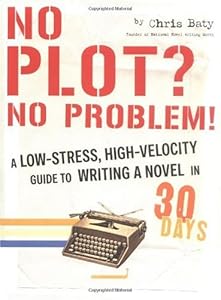| Cover via Amazon |
No Plot? No Problem!
By Chris Baty
Chapter 3: Noveling Nests, Magical Tools, and a Growing Stockpile of Delicious Incentives
This chapter discusses setting -- not of our novels, but of our writing.
I've mentioned before, I can't focus on creative writing at home. I don't know why. I can blog fine, but even if I move into another room, my brain doesn't want to work in that direction. While Baty praises the convenience of writing at home, he sees the shortcomings that always get me: distractions and fuzzy boundaries. He offers some tips for writing at home:
- Isolate yourself as much as possible
- Create uninterrupted blocks of time, and limit yourself to them
- Make yourself comfortable
- Don't write within view of a bed
- Keep your writing area neat
Baty goes on to talk about the joys of writing in public places. He prefers the coffeeshop. Well, so do I, but the only convenient Starbucks is too tiny to be useful. Things to look for in a coffeeshop?
- Plenty of outlets!
- Students!
- Quiet background music!
I don't utilize my local library branch often enough when it comes to writing; I'm seriously considering doing so this year.
Baty also talks some more about the pros and cons of writing at work. I find lunch breaks to be great for noveling, myself. His tips for writing at work?
- Tell few (if any) co-workers you're writing a novel until you're finished with it.
- Know that, unless you are working with a complete lack of supervision, you can't really relax into your story while you're supposed to be working.
- Never let your novel touch your work computer's hard drive.
- Be ready to toggle over to a "cover" file at all times.
And there's nothing wrong with writing in strange places: the bathroom, the treadmill, cheap motel rooms, bars (sounds like a plan for Sunday nights to me -- lets Chris watch multiple football games while I write), hotel lounges...
So, now that you have a place to write, you need your tools. Some things Baty suggests:
And now that we've discussed all the tools you really shouldn't eat, Baty goes on to talk about the ones you should:
- A notebook -- for when inspiration strikes while you're out and about.
- An awesome pen
- Something on which you will be typing and saving your novel
- Reference material
- Music
- A "Writing Totem" that kind of tells you that Now It Is Time For Writing. A special hat, gloves, whatever works for you. Put it on and get to work, and before long wearing it will send you to your zone.
And now that we've discussed all the tools you really shouldn't eat, Baty goes on to talk about the ones you should:
- Order takeout.
- When you do cook, make sure there's a ton of leftovers so you won't have to cook again for a while.
- Keep healthy snacks by the keyboard to trick yourself into mindlessly eating your vegetables.
- Drink a ton of water and consume a ton of caffeine, but also keep fun juices or sodas handy to mix it up.
Sidebars!
In the first sidebar of Chapter 3, Baty quotes some parents on how they juggle writing and children. The advice varies, probably because not only is every parent different, so is every child. I have no children, so I have no input.
The second sidebar discusses whether you can get a tax deduction for your noveling expenses. Short answer? Quite possibly, but it's a hassle.
The third sidebar sings the praises of coffee. Now, I'm something of a freak, insofar as I can't stand coffee and have no interest in acquiring the taste. Good thing most coffee shops also serve tea!
The fourth sings the praises of headphones, which both block out sound and provide a social bubble around you.
The second sidebar discusses whether you can get a tax deduction for your noveling expenses. Short answer? Quite possibly, but it's a hassle.
The third sidebar sings the praises of coffee. Now, I'm something of a freak, insofar as I can't stand coffee and have no interest in acquiring the taste. Good thing most coffee shops also serve tea!
The fourth sings the praises of headphones, which both block out sound and provide a social bubble around you.







No comments:
Post a Comment